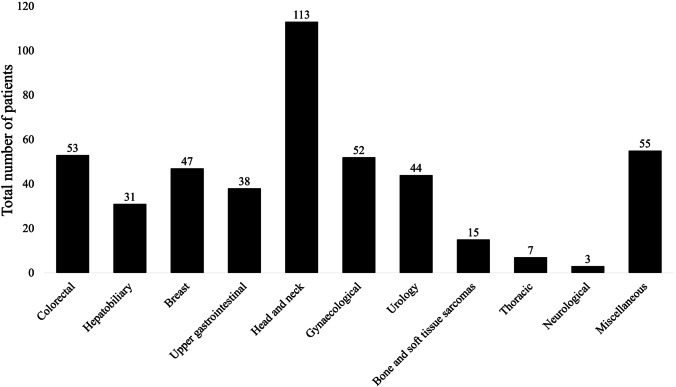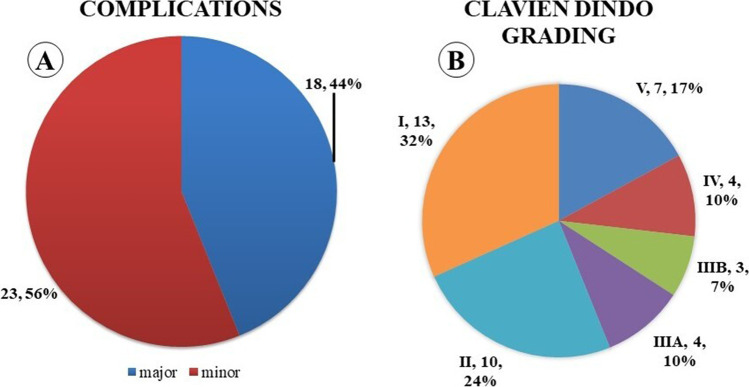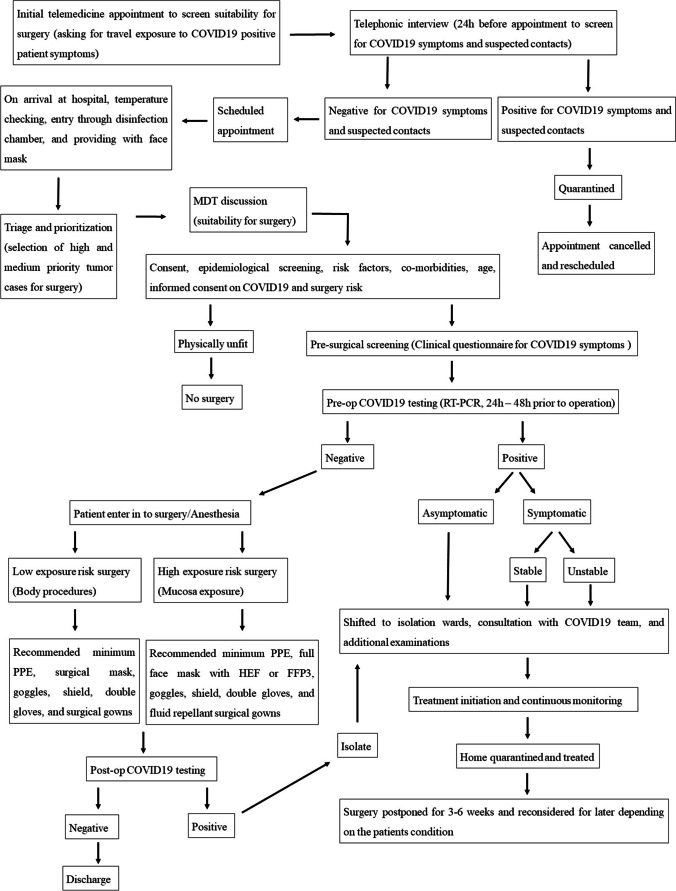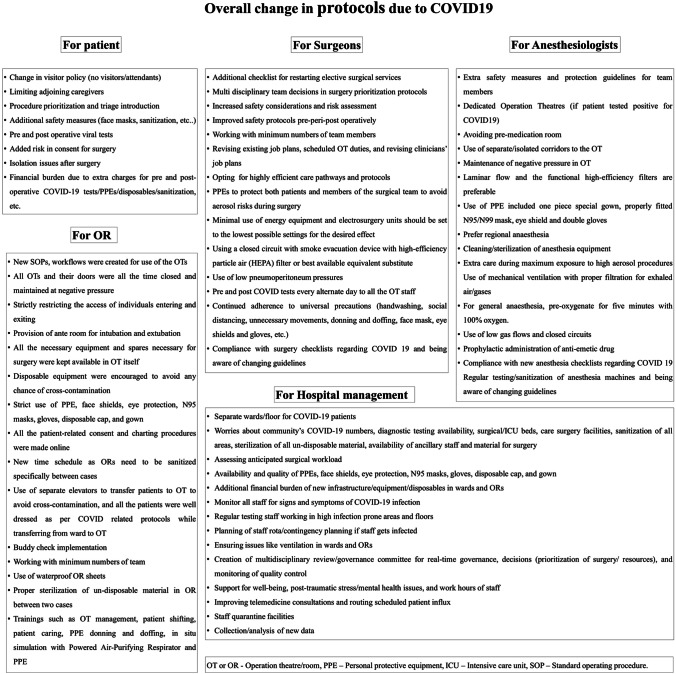Abstract
To analyse and identify possible outcomes of elective cancer surgeries performed at a tertiary cancer centre during COVID19 pandemic. This is a retrospective study including patients that underwent surgery at HCG Manavata cancer centre, Nashik, Maharashtra, India, from 15 March 2020 to 15 June 2020. Among the 458 patients that underwent elective surgeries, 54% were male and 46% were female, with a median age of 50.57 years. The most common sites of cancer distribution were head and neck (24.67%), colorectal (11.57%), gynaecological (11.35%), and breast (10.26%). Of the included patients, 92% were of American Society of Anaesthesiologists (ASA) II with comorbidities such as hypertension, and 64% underwent major surgeries with a mortality rate of 1.52% (n = 7). Average duration of surgery and hospital stay was observed to be 168.43 min and 4.4 days, respectively. Post-operatively, 7 patients were tested COVID positive and their recovery was uneventful. Despite the difficulty that set in because of COVID19 pandemic, it was proven from our study that elective cancer care surgeries can be successfully performed by following all the set guidelines.
Keywords: Elective cancer surgery, Cancer care, COVID19, Pandemic, Tertiary cancer care, Retrospective analysis
Introduction
The outbreak of novel coronavirus disease 2019 (COVID-19) is of international concern deeming the World Health Organisation (WHO) to declare it as pandemic on 11 March 2020 [1]. By the end of 10 November 2020, India has reported 8,591,730 cases, of which 7,963,457 cases were cured and 127,059 were dead [2]. In 2018, around 2.25 million people were estimated to have cancer in India with more than 11 lakh new cases every year with an estimated death rate of > 7.5 lakh patients per year [3].
In general, immune system of an individual with cancer is often weak and fragile, placing them at an increased risk to other conditions [3]. No age is immune for malignant disease but majority of the cancer patients belong to elderly age group, prevalence of other comorbidities makes them more susceptible for contracting infectious diseases. Administration of chemotherapeutic drugs to an individual suffering from cancer also diminishes/alters their immune response, making them much more susceptible to infections [4].
India has grown as a top healthcare destination for patients around the world seeking world-class treatment at an economical price [4]. The strict lockdown, travel restrictions and increase in COVID cases over the months have created a panic situation in both domestic and international cancer patients. In view of COVID19 transmission, hospitals have limited their surgical procedures to a larger extent except for the selective emergency procedures, posing a high risk in non-critically ill cancer patients [5]. To regulate and avoid any serious consequences in view of COVID pandemic and national lockdowns, various national and international cancer societies and national authorities such as American Society of Clinical Oncology (ASCO), American college of surgeons (ACS), British Association of Surgical Oncology (BASO), European society of surgical oncology (ESSO), National Comprehensive Cancer Network (NCCN), and society of surgical oncology (SSO) have recommended multiple changes in surgical procedures and treatment strategies [6–12]. Cancer hospitals around the world started following a triage system for handling patients waiting for cancer surgeries [13]. Elective surgical procedures were prioritised and performed as decided by a multidisciplinary team (MDT) on a case-to-case basis, which will impart greater benefit for patients [14].
The aim of the present study was to analyse and identify the possible outcomes of such elective cancer resections performed during the pandemic in a classified red zone (Maharashtra, India) [15]. Our secondary aim was to identify the possible complications and consequences followed by these elective cancer surgeries for better understanding of surgeons and health care workers working around the world in cancer care.
Material and Methods
Patient Screening and Selection
In this retrospective study, data of patients who underwent elective cancer surgeries at HCG Manavata cancer centre from 15 March 2020 to 15 June 2020 was collected and analysed. All the patients underwent elective surgeries on a priority basis depending on their age, stage of cancer, Eastern Cooperative Oncology Group (ECOG) status, American Society of Anesthesiologists (ASA) classification [16], comorbidities, and potentiality to cure. Pre-operative COVID test was mandated following any of the methods recommended by the Indian Council of Medical Research (ICMR), India [17].
Data Collection and Analysis
The patient’s information such as socio-demographic profile, clinical history, perioperative and postoperative parameters were collected, classified, and categorised retrospectively from the hospital’s telephonic and electronic medical records. The institutional ethical committee has cleared study from all the required ethical approvals. Descriptive statistical analysis was performed to present the data using Statistical Package for the Social Sciences version 22 (IBM SPSS Statistics version 22.0, IBM Corp., USA).
Results
Of the 458 patients that underwent elective surgeries, 54% were male and 46% were female with a mean age of 50.75 years. The mean duration of surgery and stay in hospital were 168.43 min and 4.40 days, respectively. Most of the patients in our study were of ASA grade II (92%), and 93 patients had pre-existing comorbid condition/disease such as hypertension (53.76%), diabetes mellitus (21.50%), and hypertension with diabetes mellitus (15.05%) as shown in Table 1. Two ninety-two patients underwent major surgeries and organ site distribution is depicted in Fig. 1, where head and neck cancer constituted 24.67% followed by colorectal (11.57%), gynaecological (11.35%), breast (10.26%) and urological (9.60%; Fig. 1).
Table 1.
Patients sociodemographic characteristics, clinical classification, surgical categorisation, and comorbidities (n = 458)
| Gender | |
| Male | 247 |
| Female | 211 |
| Age (years in average) | 50.74 |
| ASA classification | |
| II | 423 |
| III | 35 |
| Surgical category | |
| Major | 292 |
| Minor | 166 |
| Duration of surgery (Average time in min) | 168.43 |
| Hospital stay (Average in days) | 4.40 |
| Comorbidities | |
| HTN | 50 |
| DM | 20 |
| HTN with DM | 14 |
| IHD | 4 |
| HTN IHD | 2 |
| Parkinsonism with DM | 2 |
| PEM | 1 |
ASA Physical Status Classification System II and III – A patient with mild and severe systemic disease (14); HTN, hypertension; DM, diabetes mellitus; IHD, ischemic heart disease; PEM, protein energy malnutrition
Fig. 1.
Organ site based distribution of cancer in study population underwent elective cancer surgeries
As shown in Fig. 2, 41 out of 458 patients had unexpected postoperative events, which were major (56%) as per Clavien-Dindo classification. Using Clavien–Dindo grades, the severity of postoperative complications were classified as grade I [13 (32%)], grade II [10 (24%)], grade IIIA and IIIB [7 (17%)], grade IV [4 (10%)] and grade V [7 (17%)] [18]. Post-surgery, 7 patients and 2 surgical ward staffs who were in contact with patients were tested positive for COVID.
Fig. 2.
Clavien-Dindo classification of post-operative complications and grades
Major complications in age group < 60 years and > 60 years were found to be 2.76% and 7.6% (P = 0.026), respectively. The mortality rate between the two age groups < 60 years and > 60 years was found to be 4% and 3%, respectively. Though morbidity was higher in age group > 60 years but no statistical difference was found in mortality rate between both age groups. Due to COVID19, multiple changes were made in standard operating procedures (SOPs) for resumption of elective surgeries (Fig. 3) and along with them multiple protocol changes were done for the safety of patients, surgeons, and anaesthesiologists involved (Fig. 4).
Fig. 3.
SOPs followed during COVID19 crisis to perform elective surgeries
Fig. 4.
Change in protocols due to COVID19 for the safety of patients, surgeons, anaesthesiologists, and hospital management
Discussion
Cancer is a semi-emergency condition, where any delay in treatment may affect the patients overall survival. Its progression does not stop until and unless an intervention is sought. As COVID pandemic does not seem to halt in near future, considering the risk benefit analysis of cancer patients, we have continued our services by following all the recommendations and guidelines laid by the Government of India. However, we have restricted and streamlined the patients’ inflow by performing elective resections, telecommunication, remote care, and e-health.
In a study conducted by Liang et al., results have shown that patients with cancer were more susceptible to infections with poor prognosis compared to non-cancer patients [19]. Cancer patients are also at higher risk of infection by COVID-19. Surgical intervention in such cancer patients is critical and important to limit the disease progression, metastasis, and improve patients overall survival. Very few studies were conducted and limited data is available to assess the level of elective cancer surgeries safety during a pandemic [19–22].
Ji et al. had performed 621 elective cancer care surgeries safely without showing any risk of COVID infection in high risk patients. Results from the study have also reiterated that by taking standard precautions and following stringent pre-operative measures, any critical risks related to surgeries can be minimised at large without harming the patients [5]. In a study by Shrikhande et al., 494 elective cancer surgeries were performed and overall, 6 patients were tested COVID positive postoperatively. However, all the COVID positive patients were treated and recovered well without any further complications. The study also confirmed that by combining administrative and scientific rationale, elective cancer care surgeries can be performed safely without any delay [21]. In accordance with the previous studies, the present study also found the safety of elective surgeries and 7 patients were tested COVID positive post-operatively.
The most important thing which has a considerate value for such successful elective cancer surgeries were the efforts taken by MDT (Fig. 3) on taking a multidisciplinary decision on patient’s condition, timing of surgery, and the guidelines to be followed throughout the procedure [16]. In view of this, MDT team at our centre was given a free hand in deciding the criteria for patient selection for elective surgery and treatment decisions to be taken on a case-by-case basis, depending on the patients age, stage of cancer, ECOG status, ASA classification, comorbidities, the potentiality to cure, risk of tumour spread, metastasis, risk of nosocomial contamination with severe acute respiratory syndrome coronavirus 2 (SARS-CoV-2), morbidity, and mortality if untreated [23, 24]. A major consideration was the risk of morbidity, mortality if untreated and chances of survival in case of infected by COVID.
In our study, most of the patients who underwent surgery were male, ASA II categorised, with multiple comorbidities. No surgical restrictions were imposed; varied elective cancer surgeries were performed depending on the severity. Unexpected postoperative events were found to be very low. Only 7 patients and 2 staff have developed COVID postoperatively and recovered well without many complications.
In an international cohort study conducted by COVIDSurg Collaborative in 24 countries, the mortality rate was found to be 23.8% [25], while our study has demonstrated the lowest risk of post-operative COVID infections without any mortality. This might be attributed to the MDT decisions, strict guidelines related to post-operative isolation, experienced surgeons, adopting best surgical practices and treatment strategies followed. However, the promotion of non-operative treatment strategies and postponement of non-urgent surgical procedures was strictly followed in all the patients for their safety, especially in patients aged > 70 years [27–31]. Major complications in our study were observed in patients > 60 years, but it doesn’t affect our treatment policies and elective surgical practices. However, no statistical significance was found on comparison of morbidity and mortality rate between the two (< 60 years and > 60 years) age groups.
New SOPs, workflows (Fig. 4) were created for use of the operating theatres (OTs) and their importance was also emphasised in multiple studies [14, 23, 26, 28–33]. After each surgery, OT was completely disinfected as per disinfection guidelines [34]. The staff involved in the surgery were also encouraged to sanitise before resuming the next surgery or normal activities. Post-surgery, patients were shifted to isolation ward through pre-designated access doors and all the security measures were taken 30 min prior to discharge as per institutional protocols.
After the declaration of COVID as a global pandemic [1], many studies have confirmed the phenomenon of psychological and mental health burden in patients and doctors. To shun any such burden, psychological intervention teams were set up at our centre and regular counselling sessions were done to deal with these challenges and promising results were observed.
To the best of our knowledge, this is the second-largest study on elective cancer surgeries conducted during COVID-19 pandemic from a single cancer centre. Data from this study can be early evidence on surgical management during this COVID pandemic, which can be useful to support different surgical strategies.
At the same time, retrospective and single study institution design could be a limitation for the analysis, but the feasibility of a multicentre prospective study in this pandemic period should be considered in future studies. Other limitations include missing data during the initial days of pandemic and the data represented here is of only three months without a longitudinal follow-up. Even after pre-operative testing, few cases turned out to be COVID positive and symptomatic; there is also a high chance of missing data in asymptomatic carriers.
Conclusion
The data from the present study has shown some promising results with positive outcomes without much complication in conducting elective surgical procedures during pandemic conditions like COVID. Results from the present study can also serve as guidance for other cancer centres around the world, where the dilemma of delaying surgeries is prevalent in view of widespread COVID-related infections.
Additional Contributions
Great appreciation is owed to all of the participants who contributed to our work.
Acknowledgements
The authors would like to thank Dr. Yasam Venkata Ramesh from HCG Manavata Cancer Centre, Centre for Difficult Cancers (CDC), Nashik, India, for his medical writing assistance.
Great appreciation is owed to all surgeons, anaesthesiologists, operating room nursing staff, technicians, and attendants‐without whom surgeries could not have been possible.
Author Contribution
Concept – R.N., Y.B., Y.V.R.; Design—R.N., Y.B., Y.V.R.; Supervision – R.N.; Materials – R.N., S.R., R.D., A.A., A.M., L.B., M.U., N.K., R.T., Y.B., L.S.P., A.S., K.N.R., P.Y., S.A., B.W.; Data Collection and/or Processing – Y.B., L.S.P., A.S., K.N.R., P.Y., S.A., B.W., Y.V.R.; Analysis and/or Interpretation—R.N., Y.B., Y.V.R.; Literature Search—Y.V.R.; Writing Manuscript—Y.V.R.; Critical Review- R.N., Y.B., Y.V.R.
Data Availability
The data analyzed during the current study are not publicly available. They are available from the corresponding author on reasonable request.
Declarations
Ethics Approval and Consent to Participate
Ethics committee approval was received for this study from the Ethics Committee of Manavata Clinical Research Institute, India (ESECO19). All patients had consented for the proposed surgery. This is a retrospective analysis of prospectively maintained database which does not necessitate consenting for analysis.
Consent for Publication
All authors have consented for publication.
Conflict of Interest
The authors declare no competing interests.
Financial Disclosure
The authors declared that this study has received no financial support.
Footnotes
Publisher’s Note
Springer Nature remains neutral with regard to jurisdictional claims in published maps and institutional affiliations.
References
- 1.WHO Director-General’s opening remarks at the media briefing on COVID-19 - 11 March 2020. https://www.who.int/dg/speeches/detail/who-director-general-s-opening-remarks-at-the-media-briefing-on-covid-19---11-march-2020. Accessed 4 Aug 2020
- 2.MoHFW | Home. https://www.mohfw.gov.in/. Accessed 10 Nov 2020
- 3.Yeoh CB, Lee KJ, Rieth EF, et al. COVID-19 in the cancer patient. Anesth Analg. 2020;131:16–23. doi: 10.1213/ane.0000000000004884. [DOI] [PMC free article] [PubMed] [Google Scholar]
- 4.Hwang ES, Balch CM, Balch GC, et al. Surgical oncologists and the COVID-19 pandemic: guiding cancer patients effectively through turbulence and change. Ann Surg Oncol. 2020 doi: 10.1245/s10434-020-08673-6. [DOI] [PMC free article] [PubMed] [Google Scholar]
- 5.Ji C, Singh K, Luther AZ, Agrawal A (2020) Is elective cancer surgery safe during the COVID-19 pandemic?. World J Surg 44(10):3207–3211 [DOI] [PMC free article] [PubMed]
- 6.Cancer Services Prioritization Guidelines for COVID-19. https://www.nccn.org/covid-19/pdf/Cancer_Services_Patient_Prioritization_Guidelines.pdf. Accessed 4 Jul 2020
- 7.ESSO :: ESSO. https://www.essoweb.org/. Accessed 4 Jul 2020
- 8.BASO~ACS annual conference - BASO ~ The Association For Cancer Surgery. https://baso.org.uk/. Accessed 4 Jul 2020
- 9.COVID-19 Resources | Society of Surgical Oncology. https://www.surgonc.org/resources/covid-19-resources/. Accessed 4 Jul 2020
- 10.COVID-19 Guidelines for Triage of Cancer Surgery Patients. https://www.facs.org/covid-19/clinical-guidance/elective-case/cancer-surgery. Accessed 4 Jul 2020
- 11.American Society of Clinical Oncology | ASCO. https://www.asco.org/. Accessed 4 Jul 2020
- 12.Home - IASO India. https://iasoindia.in/. Accessed 4 Jul 2020
- 13.Bartlett DL, Howe JR, Chang G et al (2020) Management of cancer surgery cases during the COVID-19 pandemic: Considerations. Ann Surg Oncol 27(6):1717–1720 [DOI] [PMC free article] [PubMed]
- 14.Deo SVS, Kumar S, Kumar N, et al. Guiding principles for cancer surgery during the COVID-19 pandemic. Indian J Surg Oncol. 2020 doi: 10.1007/s13193-020-01082-x. [DOI] [PMC free article] [PubMed] [Google Scholar]
- 15.MoHFW | Home. https://www.mohfw.gov.in/. Accessed 4 Jul 2020
- 16.ASA Physical Status Classification System | American Society of Anesthesiologists (ASA). https://www.asahq.org/standards-and-guidelines/asa-physical-status-classification-system. Accessed 30 Jul 2020
- 17.Guidelines for COVID-19 testing in private laboratories in India. https://www.mohfw.gov.in/pdf/NotificationofICMguidelinesforCOVID19testinginprivatelaboratoriesiIndia.pdf. Accessed 25 Jul 2020
- 18.Dindo D, Demartines N, Clavien PA. Classification of surgical complications: a new proposal with evaluation in a cohort of 6336 patients and results of a survey. Ann Surg. 2004;240:205–213. doi: 10.1097/01.sla.0000133083.54934.ae. [DOI] [PMC free article] [PubMed] [Google Scholar]
- 19.Liang W, Guan W, Chen R, et al. Cancer patients in SARS-CoV-2 infection: a nationwide analysis in China. Lancet Oncol. 2020;21:335–337. doi: 10.1016/S1470-2045(20)30096-6. [DOI] [PMC free article] [PubMed] [Google Scholar]
- 20.Ji C, Singh K, Luther AZ, Agrawal A. Is elective cancer surgery safe during the COVID-19 pandemic? World J Surg. 2020;44:3207–3211. doi: 10.1007/s00268-020-05720-x. [DOI] [PMC free article] [PubMed] [Google Scholar]
- 21.Shrikhande SV, Pai PS, Bhandare MS, et al. Outcomes of elective major cancer surgery during COVID 19 at Tata Memorial Centre. Ann Surg. 2020;272:e249–e252. doi: 10.1097/sla.0000000000004116. [DOI] [PMC free article] [PubMed] [Google Scholar]
- 22.Glasbey JC, Nepogodiev D, Simoes J et al (2021) Elective cancer surgery in COVID-19-free surgical pathways during the SARS-CoV-2 pandemic: An International, Multicenter, Comparative Cohort Study. Journal of Clinical Oncology: Official Journal of the American Society of Clinical Oncology 39(1):66–78 [DOI] [PMC free article] [PubMed]
- 23.Soltany A, Hamouda M, Ghzawi A, et al. A scoping review of the impact of COVID-19 pandemic on surgical practice. Ann Med Surg. 2020;57:24–36. doi: 10.1016/j.amsu.2020.07.003. [DOI] [PMC free article] [PubMed] [Google Scholar]
- 24.Zarrintan S. Surgical operations during the COVID-19 outbreak: should elective surgeries be suspended? Int J Surg. 2020;78:5–6. doi: 10.1016/j.ijsu.2020.04.005. [DOI] [PMC free article] [PubMed] [Google Scholar]
- 25.COVIDSurg Collaborative (2020) Mortality and pulmonary complications in patients undergoing surgery with perioperative SARS-CoV-2 infection: an International Cohort Study. Lancet 396(10243):27–38 [DOI] [PMC free article] [PubMed]
- 26.Givi B, Schiff BA, Chinn SB, et al. Safety recommendations for evaluation and surgery of the head and neck during the COVID-19 pandemic. JAMA Otolaryngol - Head Neck Surg. 2020;146:579. doi: 10.1001/jamaoto.2020.0780. [DOI] [PubMed] [Google Scholar]
- 27.Raymond E, Thieblemont C, Alran S, Faivre S. Impact of the COVID-19 outbreak on the management of patients with cancer. Target Oncol. 2020;15:249–259. doi: 10.1007/s11523-020-00721-1. [DOI] [PMC free article] [PubMed] [Google Scholar]
- 28.Liu Z, Zhang Y, Wang X, et al. Recommendations for surgery during the novel coronavirus (COVID-19) epidemic. Indian J Surg. 2020;82:124–128. doi: 10.1007/s12262-020-02173-3. [DOI] [PMC free article] [PubMed] [Google Scholar]
- 29.Flemming S, Hankir M, Ernestus RI, et al. Surgery in times of COVID-19—recommendations for hospital and patient management. Langenbeck’s Arch Surg. 2020;405:359–364. doi: 10.1007/s00423-020-01888-x. [DOI] [PMC free article] [PubMed] [Google Scholar]
- 30.Wong J, Goh QY, Tan Z, et al. Preparing for a COVID-19 pandemic: a review of operating room outbreak response measures in a large tertiary hospital in Singapore. Can J Anesth. 2020;67:732–745. doi: 10.1007/s12630-020-01620-9. [DOI] [PMC free article] [PubMed] [Google Scholar]
- 31.Tan Z, Phoon P, Zeng LA (2020) Response and operating room preparation for the COVID-19 outbreak: A perspective from the National Heart Centre in Singapore. J Cardiothorac Vasc Anesth 34(9):2331–2337 [DOI] [PMC free article] [PubMed]
- 32.Ti LK, Ang LS, Foong TW, Ng BSW. What we do when a COVID-19 patient needs an operation: operating room preparation and guidance. Can J Anesth. 2020;67:756–758. doi: 10.1007/s12630-020-01617-4. [DOI] [PMC free article] [PubMed] [Google Scholar]
- 33.Coimbra R, Edwards S, Kurihara H, et al. European Society of Trauma and Emergency Surgery (ESTES) recommendations for trauma and emergency surgery preparation during times of COVID-19 infection. Eur J Trauma Emerg Surg. 2020;46:505–510. doi: 10.1007/s00068-020-01364-7. [DOI] [PMC free article] [PubMed] [Google Scholar]
- 34.Malhotra N, Bajwa S, Joshi M, et al. COVID Operation Theatre- Advisory and Position Statement of Indian Society of Anaesthesiologists (ISA National) Indian J Anaesth. 2020;64:355–362. doi: 10.4103/ija.IJA_454_20. [DOI] [PMC free article] [PubMed] [Google Scholar]
Associated Data
This section collects any data citations, data availability statements, or supplementary materials included in this article.
Data Availability Statement
The data analyzed during the current study are not publicly available. They are available from the corresponding author on reasonable request.






